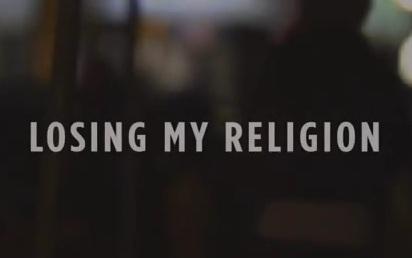
Neil Carter, over at Godless In Dixie recently wrote a great piece on what he gained when he left his religion which inspired me to consider all that I’ve lost in losing my religion. There are, inherently, a lot of built in benefits to holding to religion and maintaining a religious belief – especially if that belief is the predominant one in your community, country, or family but I find this idea largely unexplored by atheist and ex-christian writers. Losing your religion has lots of pro’s and con’s considering your particular station in life – so, what might you lose?
1: An immediate and supportive community.
Within most religions and Christianity especially there are strong communities built around churches. Stepping away from the faith meant that I was a leper in my former community, where I could call someone for help anytime I needed it and had built in job references from people that had known me for many years. I had people that, so long as what I had to say was approved, would stand behind me and support me.
There are supportive atheist communities out there, that’s important to note, but they are small and struggling to grow in small towns like mine. It’s just not the same as having hundreds of people in support of one another (again, so long as the message isn’t deviated from) the minute you join a church and become an active member. The effort required to have huge amounts of built in friends is incredibly low – as an atheist in a small town, especially as the type of atheist that is active in the community, it takes a great deal of work and networking to build any sort of clout with people. (As a small business owner, this is incredibly important.)
2: The respect of my family.
When I was still a believer, just before leaving the faith completely, I was trying to decide which seminary I should attend. I know that had I kept quiet about my doubts and went to seminary I would have been miserable and I would still be respected by my family – today, I’m not.
Even if I would have forgone seminary and pretended to believe quietly at some small church for the rest of my life they would have had considerably more respect for me than they do now, see – most of the times Christians don’t care if your faith is real or if it’s something apparent in the way you live your life – they just want you to go to church and make as few waves as possible, I’m not that type of person and I never can be and no matter how much good I do in the world they’ll never be able to respect me or the fact that I’m a person that doesn’t believe in god and makes an active effort to challenge the long held beliefs of people. Thankfully my success isn’t fueled by the respect I receive from anyone else, it’s something I have to determine a value for and I choose to value the respect of people that I can make an immediate impact on far more than those that should know me best.
3: The comfort of prayer.
It seems silly now, but growing up as a person that prayed nearly constantly I know just how powerful prayer is – just not in any way that makes any real difference in the world. Prayer doesn’t heal the sick, help you on a test, or even help sway the outcome of a football game – no matter how much we might want to believe it. Prayer does have an incredible calming effect for some people, and I was one of those people that was always greatly soothed by it and it always made me feel better, even if the end result was entirely short of a miracle or anything at all – that comfort had a value to me.
For others, prayer is an act of false piety where a quick moment of devotion is shown in order to receive something in return, this is best illustrated by scrolling through your Facebook feed to notice how many people claim to be either asking for or praying for someone else at any given time. Praying for someone else, or even saying your are going to makes people feel good and it’s a great way to avoid the moral obligation of real and meaningful help.
4: A Charitable direction
It’s easy to know where to give your expendable income or income set aside for charitable giving when you’ve got religion – if you aren’t sure, just ask your pastor or imam.
As a new atheist it can be a little confusing: What do I do with all this extra money I have now? I don’t have to give any of it away, but I do want to help other people out because it seems like the right thing to do.
Funny thing is, when you are the member of a church and tithing/giving part of your income every month you can be almost guaranteed that the money isn’t being put to any good use: Church mortgage, pastor salary, youth pastor salary, associate pastor salary, music minister salary, and other overhead costs leave very little room for actual charitable causes – and the few causes that are often promoted are commonly little more than field trips to gawk at the impoverished while wells and schoolhouses are built – while hiring contractors in the lands locally would cost far less and actually help the local economy more than free – shoddy – white labor.
The bright side is that once you’ve figured out that you’ve been subsidizing the cost of a corporation for years, you can start investigating charities that actually deserve your money and that will use it more efficiently. I’ve made it a long time habit to support local animal shelters, the ASPCA, St. Baldricks, and to help people locally that need it, quietly and without bragging about it. I find that giving is much more fulfilling now that I know exactly where the money I give is going and can easily change the direction of my funds when I decide to do so.
5: Self loathing
Christianity is founded upon the idea that mankind is a fallen creation and that as such is wicked from birth and in need of a savior in order to appease god’s wrath, which all of mankind deserves. Enter Jesus.
A lot of people like to celebrate Jesus for being that savior, but I’ve always struggled with the first part: The idea that I’m so eternally and irrevocably wicked that God had to kill his son on my behalf to save me from his own wrath. Mental acrobatics aside, the message that I’m that evil was one I was never able to shake – no matter how much I tried to celebrate Jesus’ grace and mercy, and so I found it to be second nature as a child and as a young adult to hate every part of myself that god thought was unworthy of grace: my “Sin Nature”. I even had a Biblical argument for it in 2 Peter ch. 2 which warned against being submitted to your carnal desires and putting your flesh to death.
When I think back on my time as a Christian the most prevalent emotion is one of self loathing. I remember so clearly how much I hated myself but loved Jesus for loving me anyway. I look back on that and realize how damaging that was to me as a young person and how damaging that is to any person now who still believes it – and it’s prevalent in every single Christian theology that exists to my knowledge (Islam has a similar idea as well).
I don’t miss feeling that way about myself, and losing my religion was worth it as the prize was learning to love myself and to recognize my many good qualities. There’s something life changing about the transition from a guy who knows without a shadow of a doubt that he’s a sinner saved only by god’s grace to one that’s just a person trying to do the best he can to make a positive impact on the world around him and it feels a lot more hopeful than it did before.
6. Easy Answers
I remember being able to look up a verse in the Bible and apply to to practically any situation you could think of and think, “Yep, God’s really got it all figured out here!”. Growing up somewhat fundamentalist I knew the answer to every big question: The age of the universe? 6000 years, duh! Evolution? LIE! Thankfully I was able to embrace more liberal iterations of the Christian religion before eventually leaving it altogether, and with that science too – but there’s an incredible convenience that comes with knowing the creator of the universe: you get to ask him to answer all your hard questions and he’ll give you easy answers.
If I didn’t know how to handle a situation I could just pray about it, rarely did I have to tackle a problem head on because I could just sit back and ask God to be the commander of my life. If I didn’t know why something terrible occurred I could just rely on the old standard, “It was god’s plan” with full knowledge that “god works in mysterious ways”. You look at the world differently when you actually have to sit back and figure things out, or get your hands dirty to fix a problem – and the most frustrating position of all for a formerly devote know-it-all: to admit that you simply don’t know.
Conclusion
My faith was the most important aspect of my life and losing it was a life changing ordeal that rocked my world in ways that I’ll probably never be able to clearly communicate. You’ll lose a lot: family, friends, church – and their respect. You’ll lose the ability to pray and the ability to answer every question with “but god”. You’ll also gain a whole lot more: Self respect, a love for yourself, and a challenge to work hard toward the world you want to see in the way that you approach life.
